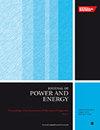Analytical modeling and performance improvement of an electric two-stage centrifugal compressor for fuel cell vehicles
IF 1.1
4区 工程技术
Q3 ENGINEERING, MECHANICAL
Proceedings of the Institution of Mechanical Engineers, Part A: Journal of Power and Energy
Pub Date : 2024-09-11
DOI:10.1177/09576509241283612
引用次数: 0
Abstract
The integrated two-stage electric centrifugal compressors are most widely used in the present fuel cell vehicles. Air compressors influence the efficiency of fuel cell systems significantly, so it is crucial to improve the energy efficiency of centrifugal compressors. However, there is a lack of centrifugal compressor performance models that can reflect the thermodynamic characteristics of two-stage compression system, which is the main focus of this paper. In this paper, an analytical model of two-stage centrifugal compressor performance considering the thermodynamic characteristics of two-stage compression was first derived and experimentally validated. The single-stage centrifugal compressor model (SSCCM) can be treated as a lumped parameter model of the two-stage centrifugal compressor to predict the compressor performance. Therefore, the SSCCM and the two-stage centrifugal compressor model (TSCCM) were compared. The results show that the TSCCM is more accurate and robust. Furthermore, a novel compressor structure equipped with an intercooler in the inter-stage piping was proposed to improve the energy efficiency of the centrifugal compressor. Based on this novel structure, the TSCCM was modified. Finally, a quantitative analysis was performed to study the effect of an inter-stage intercooler on compressor efficiency. Compared to the original compressor without the inter-stage intercooler, the efficiency improvement by the inter-stage intercooler can be in the range of 3.29–3.97%, with power savings of 0.332–0.635 kW. The study can be used to support engineers and researchers in fast identifying effective solutions in terms of design for the next generation of centrifugal compressors.用于燃料电池汽车的电动双级离心压缩机的分析建模和性能改进
集成式双级电动离心压缩机在目前的燃料电池汽车中应用最为广泛。空气压缩机对燃料电池系统的效率影响很大,因此提高离心压缩机的能效至关重要。然而,目前还缺乏能反映两级压缩系统热力学特性的离心压缩机性能模型,而这正是本文的重点。本文首先推导出考虑了两级压缩热力学特性的两级离心压缩机性能分析模型,并进行了实验验证。单级离心压缩机模型(SSCCM)可视为双级离心压缩机的集合参数模型,用于预测压缩机性能。因此,对 SSCCM 和双级离心压缩机模型(TSCCM)进行了比较。结果表明,TSCCM 更精确、更稳健。此外,还提出了一种在级间管道中配备中间冷却器的新型压缩机结构,以提高离心式压缩机的能效。基于这种新型结构,对 TSCCM 进行了修改。最后,对级间中间冷却器对压缩机效率的影响进行了定量分析。与未安装级间中间冷却器的原始压缩机相比,级间中间冷却器的效率提高了 3.29%-3.97%,功率节省了 0.332-0.635 kW。这项研究可为工程师和研究人员提供支持,帮助他们快速确定下一代离心式压缩机设计方面的有效解决方案。
本文章由计算机程序翻译,如有差异,请以英文原文为准。
求助全文
约1分钟内获得全文
求助全文
来源期刊

CiteScore
3.30
自引率
5.90%
发文量
114
审稿时长
5.4 months
期刊介绍:
The Journal of Power and Energy, Part A of the Proceedings of the Institution of Mechanical Engineers, is dedicated to publishing peer-reviewed papers of high scientific quality on all aspects of the technology of energy conversion systems.
 求助内容:
求助内容: 应助结果提醒方式:
应助结果提醒方式:


